VLAN Trunking Protocol VTP Tutorial
This topic describes the features that VLAN Trunking Protocol (VTP) offers to support VLANs. To help you understand the basic concept, this is a summary of what VTP is:
“VTP allows a network manager to configure a switch so that it will propagate VLAN configurations to other switches in the network”
VTP minimizes misconfigurations and configuration inconsistencies that can cause problems, such as duplicate VLAN names or incorrect VLAN-type specifications. VTP helps you simplify management of the VLAN database across multiple switches.
VTP is a Cisco-proprietary protocol and is available on most of the Cisco switches.
Why we need VTP?
To answer this question, let’s discuss a real and popular network topology.
Suppose you are working in a medium company in a 5-floor office. You assigned each floor to a switch for easy management and of course they can be assigned to different VLANs. For example, your bosses can sit in any floor and still access Manage VLAN (VLAN 7). Your technical colleagues can sit anywhere on the floors to access Technical VLAN (VLAN 4). This is the best design because each person’s permission is not limited by the physical location.
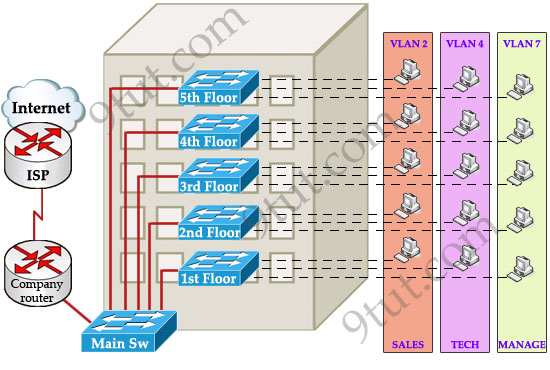
Now let’s discuss about VTP role in this topology! Suppose VTP is not running on these switches. One day, your boss decides to add a new department to your office, the Support Department, and you are tasked to add a new SUPPORT VLAN for this department. How will you do that? Well, without VTP you have to go to each switch to enable this new VLAN. Fortunately your office only has 5 floors so you can finish this task in some hours :)
But just imagine if your company was bigger with 100-floor office and some VLANs needed to be added every month! Well, it will surely become a daunting task to add a new VLAN like this. Luckily, Cisco always “thinks big” to create a method for you to just sit at the “Main Sw”, adding your new VLANs and magically, other switches automatically learn about this VLAN, sweet, right? It is not a dream, it is what VTP does for you!
How VTP Works
To make switches exchange their VLAN information with each other, they need to be configured in the same VTP domain. Only switches belonging to the same domain share their VLAN information. When a change is made to the VLAN database, it is propagated to all switches via VTP advertisements.
To maintain domain consistency, only one switch should be allowed to create (or delete, modify) new VLAN. This switch is like the “master” of the whole VTP domain and it is operated in Server mode. This is also the default mode.
Other switches are only allowed to receive and forward updates from the “server” switch. They are operated in Client mode.
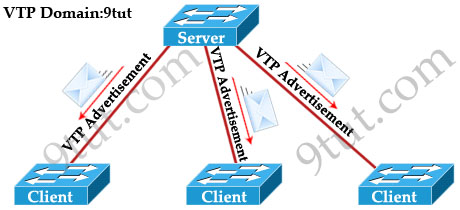
In some cases, the network manager doesn’t want a switch to learn VTP information from other switches. He can set it to Transparent mode. In this mode, a switch maintains its own VLAN database and never learn VTP information from other switches (even the server). However, it still forwards VTP advertisements from the server to other switches (but doesn’t read that update). A transparent switch can add, delete and modify VLAN database locally.
Now return to the example above, we can configure any switches as the “server” but for our convenience, the “Main Sw” should be assigned this function and we should place it in a safe place.
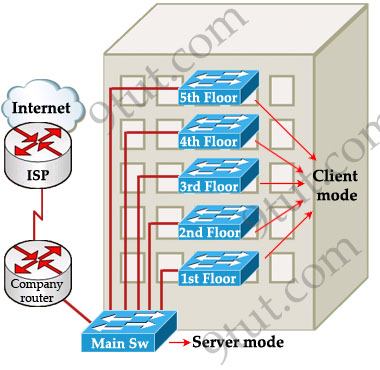
As said above, VTP advertisements bring VLAN information to all the switches in a VTP domain. Each VTP advertisement is sent with a Revision number. This number is used in order to determine whether the VTP advertisement is more recent than the current version of that switch. Because each time you make a VLAN change in a switch, the configuration revision is incremented by one. So the higher the revision number, the better your VTP advertisement.
For example, the first time the Main Sw sends a VTP advertisement, its Revision number is 1. When you add a new VLAN to the Main Sw, it will send a VTP advertisement with the Revision number of 2. Client switches first receive the VTP advertisement with the Revision number of 1, which is bigger than its current Revision number (0) so it updates its VLAN database. Next it receives the VTP advertisement with the Revision number of 2, it continues comparing with its current Revision number (1) -> it continues update its VLAN database.
One important thing you must know is when a switch receives a better VTP advertisement, it deletes its whole VTP information and copy the new information from the better VTP advertisement to its VLAN database. A switch does not try to compare its own VLAN database with information from the received VTP advertisements to find out and update the difference!
Note: VTP advertisements are sent as multicast frames and all neighbors in that domain receive the frames.
The “show vtp status” command analysis
The most important command to view the status of VTP on Cisco switches that each CCNA learners must grasp is the “show vtp status” command. Let’s have a look at the output of this command:

+ VTP Version: displays the VTP version the switch is running. By default, the switch runs version 1 but can be set to version 2. Within a domain, the two VTP versions are not interoperable so make sure to configure the same VTP version on every switch in a domain.
+ Configuration Revision: current Revision number on this switch.
+ Maximum VLANs Supported Locally: maximum number of VLANs supported locally.
+ Number of Existing VLANs: Number of existing VLANs.
+ VTP Operating Mode: can be server, client, or transparent.
+ VTP Domain Name: name that identifies the administrative domain for the switch.
By default, a switch operates in VTP Server mode with a NULL (blank) domain name with no password configured (the password field is not listed in the output)
+ VTP Pruning Mode: displays whether pruning is enabled or disabled. We will discuss about VTP Pruning later.
+ VTP V2 Mode: displays if VTP version 2 mode is enabled. VTP version 2 is disabled by default.
+ VTP Traps Generation: displays whether VTP traps are sent to a network management station.
+ MD5 Digest: a 16-byte checksum of the VTP configuration.
+ Configuration Last Modified: date and time of the last configuration modification. Displays the IP address of the switch that caused the configuration change to the database.
VTP Pruning
To understand what VTP Pruning is, let’s see an example:
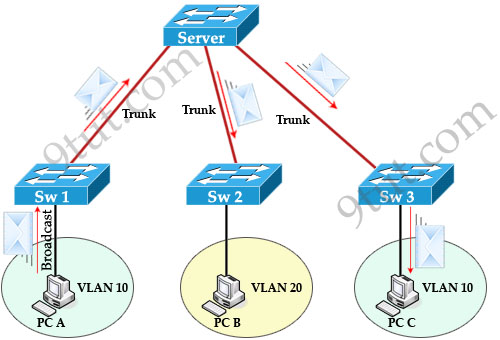
When PC A sends a broadcast frame on VLAN 10, it travels across all trunk links in the VTP domain. Switches Server, Sw2, and Sw3 all receive broadcast frames from PC A. But only Sw3 has user on VLAN 10 and it is a waste of bandwidth on Sw2. Moreover, that broadcast traffic also consumes processor time on Sw2. The link between switches Server and Sw2 does not carry any VLAN 10 traffic so it can be “pruned”.
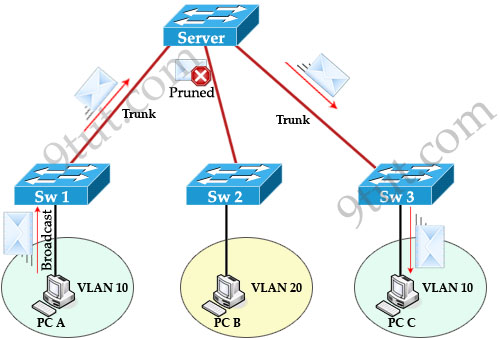
VTP Pruning makes more efficient use of trunk bandwidth by forwarding broadcast and unknown unicast frames on a VLAN only if the switch on the receiving end of the trunk has ports in that VLAN. In the above example, Server switch doesn’t send broadcast frame to Sw2 because Sw2 doesn’t have ports in VLAN 10.
When a switch has a port associated with a VLAN, the switch sends an advertisement to its neighbors to inform that it has active ports on that VLAN. For example, Sw3 sends an advertisement to Server switch to inform that it has active port for VLAN 10. Sw2 has not advertised about VLAN 10 so Server switch will prune VLAN 10 on the trunk to Sw2.
You only need to enable pruning on one VTP server switch in the domain.
VTP Configuration
Main Sw(config)#vtp version 2
Main Sw(config)#vtp domain 9tut
Main Sw(config)#vtp mode server
Main Sw(config)#vtp password keepitsecret
On client switches
Client(config)#vtp version 2
Client(config)#vtp domain 9tut
Client(config)#vtp password keepitsecret
Client(config)#vtp mode client
Notice: Before configuring VTP make sure the links between your switches are trunk links. Your trunk link can automatically be formed if both of your switches are not 2960 or 3560 because ports on the 2960 and 3560 switches are set to dynamic auto by default. If both sides are set to dynamic auto, the link will remain in access mode. To configure trunk between these ports, use these commands:
Client(config)#interface fa0/1 (or the interface on the link you want to be trunk)
Client(config-if)#switchport mode trunk
These commands only need to be used on one of two switches to form the trunk.
Below summaries important notes about VTP:
+ Whenever a change occurs in the VLAN database, the VTP server increments its configuration revision number and then advertises the new revision throughout the VTP domain via VTP advertisements.
+ VTP operates in one of three modes: server, transparent, or client.
VTP modes:
* Server: The default mode. When you make a change to the VLAN configuration on a VTP server, the change is propagated to all switches in the VTP domain. VTP messages are transmitted out of all the trunk connections. In Server mode we can create, modify, delete VLANs.
* Client: cannot make changes to the VLAN configuration when in this mode; however, a VTP client can send any VLANs currently listed in its database to other VTP switches. VTP client also forwards VTP advertisements (but cannot create VTP advertisements).
* Transparent: When you make a change to the VLAN configuration in this mode, the change affects only the local switch and does not propagate to other switches in the VTP domain. VTP transparent mode does forward VTP advertisements that it receives within the domain.
VTP Pruning makes more efficient use of trunk bandwidth by forwarding broadcast and unknown unicast frames on a VLAN only if the switch on the receiving end of the trunk has ports in that VLAN.
For more information about VTP, I highly recommend you to visit the official tutorial about VTP published by Cisco. It is very comprehensive: http://www.cisco.com/warp/public/473/vtp_flash/



please send me last dumps in icnd2 to 2013sarasmith@gmail.com
please…send me the latests dumps.i am taking exam in september. thanks in advanced. bern_jv88@yahoo.com
please…send me the latests dumps.i am taking exam in september. thanks in advanced rikbaster@gmail.com
Hi Guys,
Please send me latest dumps to Nagarjunv1990@gmail.com. I gonna write CCNA exam next week. Thanks in advance
please someone kindly help! need any current dump, to have a final brush-up for the exam in september immyrichardson@yahoo.com, thanks..
thanks dear, please send latest dumps at vickey_1@hotmail.com, i take CCNA exam next week
Please send me the latest dumps to denis.lagat@gmail.com. I am sitting for CCNA in a few weeks. Thanks
pls send me the latest dump CCNa 640 802
email: echazar@aol.com
please send me last dumps in icnd2 to sara.romagnoli.net@hotmail.it
pls send me the latest dump CCNa 640 802
email : leuw_stay@yahoo.com
Please send me the latest dump CCNA 640-802. I’ve covered most of the studying and have scheduled the end of Sep.
mjeyana@gmail.com
Hi Everyone
I heard from some of my friends that nowadays CCNA has given difficult labs and questions in CCNA Exam. Is it true or fake. By the way, I am preparing myself from latest DUMPs of Sekhar and Acme etc.
your help would be appreciated.
please…send me the latests dumps.i am taking exam in september. ccna 640-802 thanks.
johnell_tribo@yahoo.com
Plz send me latest dumps, I m going to appear next week.
karimmahboob@hotmail.com
please send me last dumps im taking exam in september ccna 640-802 vvaal.r@gmail.com pls
is there any jobs on ccna
Please can anyone send to me the latest dumps next week i will take my exam…
and for examcollection , i download the try vce , but I don’t have the register code .
anyone can help me I will be appreciate
@CCNA Student
send me an email, gadgetjockey@gmail.com.
i can help you with the VCE code.
Please send any new dumps to peecash512@yahoo.com My test is scheduled for next week Sept 27/2013. Help if you can. Thanks in advance.
Can anyone please send me the latest dumps to PTS2002@hotmail.com I will be taking the test this Friday, 9-27-2013.
Can anyone please send me the latest dumps to ttiger36@hotmail.com I will be taking the test this Friday, 9-27-2013.
Please send me the latest dump to xone.sx@gmail.com, I’ll be taking it tomorrow. Appreciate it so much.
Will you please send me the latest dump for single CCNA exam 640-802? I am taking Saturday. thanks- martinsaddison@gmail.com
Latest dumps please to ivanovicivan20@yahoo.com. I’ll be taking it on 30th.
Can I have the latest dump aswell please, taking it on Monday 30.
mamduh@gmail.com
excellent excellent excellent
Can you please send me the latest dump for CCNA exam 200-120 ? I will be taking the test next week.thanks
eyobyetages@yahoo.com
Please send me the latest ICND2 dump to gtanase007@yahoo.com
Can you please send me the latest dump for CCNA exam 200-120 ? I will be taking the test soon. jsouda@gmal.com . Thank you.
Please send me INCD2 dumps electronbridge@hotmail.com
Can you send me the latest dump for CCNA 200-120 please. I will be taking the exam next week. dnight@gmail.com. Thank you
can you send me the latest dump for CCNA 200-100 plz tieto125@hotmaul.com
Anyone send me the latest dumps and tell me the procedure taht how to open these dumps??
arsalan_duli@yahoo.com
Can anyone send me any ICND1 or ICND2 dumps? Mithrandir27@msn.com
Will pass them on. Thanks!!
Can you send me the latest dump for CCNA 200-120 please. I will be taking the exam next week. yksi1971@yahoo.com. Thank you
yksi1971@yahoo.com
hi guys,
can any one send me the latest dumps i want to write ccna nest month
send to insulator2009@yahoo.com
thanks
Hello all, taking ICND1 nest week can anyone forward latest dumps? terrenceaw@outlook.com
Can you send me the latest dump for CCNA 200-120 please I taking the exam soon. Send it to tyumei@hotmail.com
Can anyone send me the 200-101 latest dump to email: strawberryme2014@gmail.com
hi pls send CCNA DUMP 200-120
my mail id : roshanrox101@gmail.com
Hi friend,
Please sent me latest dump CCNA 200-120 exam. will taking exam soon my mail ID:- istiyaque786@gmail.com . Thanks for advance
Please sent me latest dump CCNA 200-120 exam. will taking exam soon my mail ID: danieliturbe@hotmail.com
Hi please send me ICND1 dump to wkielly@yahoo.com
Thanks
HI every one!
can you please send me ICND1 dump to sami.dsami@gmail.com
please send me ccnax v2 200-120 i will go exam after week !!!!!!
thankyou alot !
please send me ccnax v2 200-120 i will go exam after week !!!!!!
thankyou alot !
my email teach4@outlook.sa
please and please please
Anyone still getting this lab in the EXAM ICND 2 ?? Thanks guys i would really appreciate it if you tell me.
Ciscoita.
very good documentation
thanks
Can you send me the latest dump for CCNA 200-120 please. I will be taking the exam next week. gedlyka@gmail.com Thank you